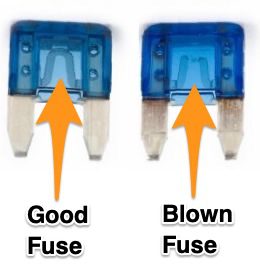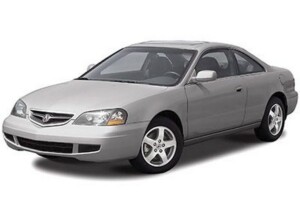Fuses melt (or blow) due to the circuit load being exceeded. This can happen for a number of reasons. Here we discuss the most common typical problems.

Cigarette lighter socket
A cigarette lighter socket is often used as a power supply for various auxiliary car devices such as:
- radar detectors;
- navigators;
- air compressors;
- mobile phone chargers;
- multi splitters;
- other car gadgets.
However, some of these may be of questionable quality. In addition, plugging several devices into the socket at the same time can cause an overload
Window washer
Fuse failure can be caused by water freezing in a washer reservoir and washer system hoses. Frozen water affects the drive of the electric pump. As a result, the current increases and a fuse blows. To prevent this, replace the water with an antifreeze fluid in good time.
Windscreen wipers
A fuse may blow if the windscreen wipers have frozen to a windscreen due to the transmission jamming.
Defogger and rear-view mirror heater
These can burn out due to a short in the wiring. The most “weak” wiring points are in the front door corrugated hoses, boot doors and under the driver’s sill.
Heater
As the electric motor of the heater wears, especially the bearings and bushings, the current in the electric drive circuit increases significantly. To avoid this, ensure that the heater fan is properly maintained.
Lighting system
Fuses are often blown when non-standard lamps are installed, especially xenon short arc lamps which have a higher current draw. If you increase the wattage, you must also upgrade the lamp wiring. To do this, rewire your lighting system using cables with a larger cross-section.
Engine cooling system
They fail when the current consumption of an electric fan increases. This can happen for the following reasons
- Foreign matter entering the fan blade rotation area;
- Fan motor wear;
- Engine lubrication depletion.
Engine control unit
If they blow, the engine will not start. For this reason, a driver needs to know the location of the fuses that serve an engine control unit. Almost half of all problems relating to engine start failure are due to the unit melting.
Electric parking brake
An electric parking brake drive is located in the “uncomfortable” place near the wheels. This can compromise the integrity of the unit and allow moisture and dirt to enter. As a result, an engine may jam, causing fuses to blow.
Anti-lock braking system (ABS)
As the pumps wear, the current increases. This can cause the fuse to blow.
Central locking, electric windows
Central locking and electric window lifts often become jammed. This can cause fuses to blow. Wiring faults and damage to a corrugated hose in the door wiring can also be to blame.
WARNING!
It is extremely dangerous to install fuses larger than the rated value specified by the manufacturer! A wire cross-section may not be suitable for an increased current. This can lead to overheating, which can cause a short circuit in the wiring and a fire in the wiring as well as in the adjacent fabric and other elements. Do not use a circuit breaker that is not specified by the vehicle manufacturer.
Never use a direct wire in place of a fuse!
